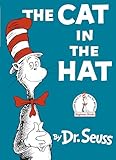 The very first book I can remember wanting to read is Dr. Seuss’s The Cat in the Hat. I have a vivid memory of being about four years old, sitting up in my bed with my table lamp on, looking at the cover of the book and wishing with all my might that I could read it myself. Nevermind, as my mother says, that I had the book memorized. I wanted to really read it.
The very first book I can remember wanting to read is Dr. Seuss’s The Cat in the Hat. I have a vivid memory of being about four years old, sitting up in my bed with my table lamp on, looking at the cover of the book and wishing with all my might that I could read it myself. Nevermind, as my mother says, that I had the book memorized. I wanted to really read it.
I can remember when I couldn’t read — at least I recall that one memory of wishing I could read, but I don’t remember learning to read. It just seemed that all of a sudden I could. I think that is how many people learn to read. They break the letter code and can sound out words. My daughter Maggie just passed that milestone. I can remember when Sarah did, too. My son Dylan, who is most likely somewhere on the autism spectrum, just demonstrated an understanding of how words work. On his MagnaDoodle slate, he wrote the letters “C,” “I,” and “T.” After several tries at communicating, he finally made us understand he was trying to say “cat.” We were amazed. This is a child who has spoken only a handful of words, and those words were unclear. It makes me wonder what sorts of “cats” my kids will pull out of their hats next.
This post is Part One of a series. You can find links to each post in this series on My Life in Books.
As a teacher you are probably well aware of the different ways children learn to read, but as a mother of three I learned it the hard way.
My first son was an instant reader, that is he had the ability to basically memorize words a.k.a. a sight reader.
My second son on the other hand was the total opposite, he needed to learn to read through intense phonics. Unfortunately we sort of wasted two years of his life on flash card tutoring before I discovered the Orton-Gillingham approach through a proper evaluation of his needs. It is a very unique system to teach children that struggle with the process of reading. This technique gave us hope and progress which basically saved our family, because a problem with one child extends to the other members.
As for the third one, well she was writing plays by the age of four. She is a whole other story.